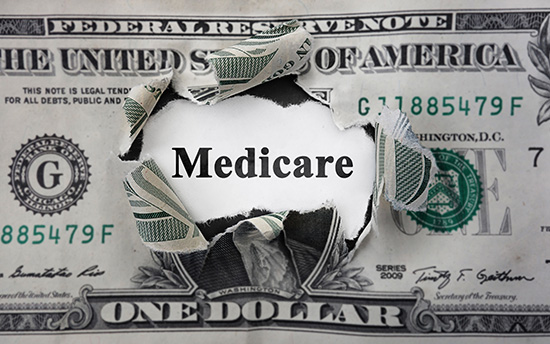There are few more controversial phrases these days than “Medicare for All.” To many left leaning thinkers, the idea of Universal, Government Run Healthcare is an idea whose time has come. To more conservative pundits, these three words conjure up fears of a Bolshevik communist revolution. The furious debate has driven down the prices of many well established healthcare stocks. But what is fact, and what is fiction? Here is a rundown of four common misunderstandings about the “Medicare for All” debate, and how this controversy could affect your investments…
1. “Medicare for All” would mean certain disaster for Big Pharma and Biotech.
As the Democratic party has moved forward in it’s presidential nomination process, talk of “Medicare for All,” or “Single Payer” has intensified amongst some of the more left leaning candidates. They promise to totally replace our current healthcare system with Federal Government becoming the only major payor and provider of healthcare for all citizens.
This talk has punished the share price of many well established Big Pharma and Biotech companies. The thinking goes: if the Feds directly take over healthcare, and we wind up with a British style NHS socialized system, the days of big paychecks for Big Pharma are over. Big Pharma would only have one buyer to negotiate with, and of course that one giant Federal buyer could effectively dictate prices.
This thinking is just plain wrong on two fronts. First, while Single Payer could mean lower profit margins and more modest price tags, it could also lead to a massive expansion of potential patients for Big Pharma. According to the Kaiser Foundation, we still have 27 million uninsured Americans in this country, who currently bring in $0 for Big Pharma. There are many millions more who could be described as “shaky” in their insurance situation….just one job loss away from being uninsured. If Medicare for All truly came to pass (a big IF), it could just result in a much larger patient base for America’s Pharmaceutical Industry.
The other huge fallacy in fears related to Single Payer is the assumption that, with just one Payor, the Federal Government would keep a lid on healthcare prices. This seems logical, but the assumption runs directly counter to how we know our Federal Government has always worked.
Since 1776, the American Federal Government has always come under the influence of lobbyists. The Federal Government, ultimately, is just made up of people, and people can be gotten to. People have been influenced by corporate lobbies in Republican administrations, Democratic administrations….even when there was a Whig party, men in fine suits with fancy watches still helped mold laws to the liking of Corporate America.
Medicare today pays almost any price for almost any treatment. Would it really be realistic to think that a greatly expanded Medicare would suddenly become the model of tough negotiation and frugality? Remember, once it’s “everybody’s money,” then really, it’s “nobody’s money.”
Medicare for All could be rough for Big Pharma and Biotech. Or it could be the greatest single bonanza in American History…
2. Universal Healthcare would greatly reduce, or eliminate, private insurers once and for all.
The current concept that has the most traction in progressive circles is to totally scrap our current healthcare system, and start all over with a system similar to the National Health Service in Britain. This would mean no private insurers, with care delivered directly by the Federal Government.
While “total government everything” is the concept of the day, it’s critical to realize that many developed nations have achieved Universal Health Care by embracing private enterprise, rather than shunning it. Germany is one example. Although all Germans are guaranteed some form of health insurance or another, they can currently choose from 123 different insurance providers. These function very similar to Medicare Advantage plans in the United States.
In fact, Medicare Advantage has only grown in popularity since it was introduced in the United States twenty years ago. In Medicare Advantage, ultimate funding comes from Uncle Sam, but private insurers contract with the Federal Government to provide services for profit. Medicare Beneficiaries can choose between signing up for one of many private plans, or they can still chose original, government run Medicare. This means that Medicare Beneficiaries benefit from different insurers vigorously competing for their business. Insurers such as United and Humana have grown fabulously rich while simultaneously providing a service that millions of elderly Americans have embraced.
Knowing what we know about America’s famously entrepreneurial and business friendly culture, does it really seem likely that most Americans would want private enterprise totally removed from Healthcare? Or does it seem more likely that we would follow the already successful blueprint that we have established with Medicare Advantage?
3. Universal Healthcare is a radical idea that has never been tried before. We can’t predict what will happen…
Part of what has pummeled healthcare stock prices is the simple uncertainty related to progressive saber rattling on the Medicare for All topic. Simply put, Corporate America is mostly filled with conservative thinkers, who prefer measured risks, if they must take risks at all. The same for corporate shareholders. Any kind of unpredictability, or sudden change, runs counter to the culture of these corporate behemoths.
But it’s a fallacy to believe that we are drifting into uncharted territory. In fact, as a nation, we already have at least ten years of tumultuous healthcare reform experience under our belt. There are a few basic, but obvious lessons that media pundits are ignoring.
The most important lesson is something that we all should have understood from our 8th grade Civics class. Simply put, it is really, really hard to get radical, sudden change passed through the American Tri-Branch form of government. This has nothing to do, per se, with healthcare reform, and everything to do with the fact that our Founding Fathers did not design a law making system capable of easy change. Let’s consider the story of Obamacare.
We all know that Obamacare today has fallen far short of Universal Healthcare. Although Obamacare has significantly reduced the uninsured population, we still have those 27 million Americans with little or no access to basic healthcare. This certainly was not the original intention of Obamacare! Of course the initial goal was Universal coverage, but the Democrats just couldn’t get all of the things they wanted through the Congress, the Senate, and the Judicial branch. It is exceedingly difficult for one party to control all three branches of our government at once, and even more difficult to hold onto that control for more than a few years. Even during the rare times when one party predominates, internal divisions within that dominant party often mean radical change is impossible. So, Barack Obama’s bold attempt at remaking American Healthcare became an imperfect set of compromises and half measures.
But even those compromises and half measures were not built to last. Obama was never able to get the full congressional support that would have been necessary to enshrine Universal Healthcare in American Law forever, so a lot of gimmicky legislative tactics were employed. Essentially, the Democrats wound up trying to bind together a rocket ship with tape and chewing gum.
Now the Republicans have slowly but surely chipped away at these weak bindings to cripple Obamacare. But even the Right, with total control over all three branches of government during 2016/2017, were unable to repeal Obamacare outright. After blustering and vowing to erase all Obama era healthcare programs, the Republicans have only gradually backed away from Obamacare!
In short, our American Governmental system does not like big changes that happen quickly. Even if one of the more radical progressive members of the Democratic Party were to become President, he or she would need an unprecedented, sustained wave of radical blue to wash away our current healthcare system and start from scratch. Not likely.
4. Universal Healthcare will be affordable, because we can simply raise taxes on the mega rich…
It can be no secret at this point that economic inequality is the new hallmark of twenty first century America. Over the last few years, thousands of journalists and economists have chronicled in painstaking detail the massive accumulation of wealth at the top of the American Economic Pyramid. This should make it easy to pay for “Medicare for All,” the thinking goes. Just tax America’s new Aristocracy to help the common man out.
Leaving aside the raging debate about the fairness of that concept, (and it is a worthy debate), a few of the more credible, unbiased news sources have pointed out simple, mathematical fact; soaking the Rich just won’t raise enough money. Forget social justice; the math just doesn’t work. This from Bloomberg Magazine:
The simple fact is that financing Medicare-for-all would require a dramatic shift in the federal tax structure and a substantial tax increase for almost all Americans.
…(Bernie) Sanders’s office estimates that raising federal tax rates on the wealthiest Americans to 52 percent, and ending favorable tax treatment for capital gains and dividends, would cover just 5 percent of the cost of Medicare-for-all. (Karl W. Smith, 8/27/18)
Remember Germany, with it’s nifty public/private hybrid Universal Healthcare system? Germany has one of the highest taxation rates in the world. While the taxation plan is progressive, anyone with a decent income is essentially 50/50 partners with the German state. Anyone with an income exceeding roughly $65,000 pays income tax of 42%, PLUS a wide range of other daily taxes that are unavoidable. If there is one thing we know about Germans, it is that they are good at math. If they could simply pay for their generous social safety net by taxing barons and billionaires, they would.
So, are regular, middle class Americans ready to partner with Uncle Sam, 50/50, for life? That highly dubious proposition is anybody’s guess, but there is one example we could consider.
Vermont, home to both Ben and Jerry’s and Bernie Sanders, came within inches of creating its own Universal Healthcare System. Remember that excruciating balance between branches of government that would be necessary for such a radical change? Somehow all of the stars lined up between 2012 and 2014, and Vermont almost had its own, 100% government funded plan on the edge of becoming reality. So what happened?
According to Politico Magazine:
“Vermont under (Governor) Shumlin became the most visible trailblazer. Until Wednesday, when the governor admitted what critics had said all along: He couldn’t pay for it.” (Sarah Wheaton, 2/20/14)
Even left leaning media outlets have had to admit that America may just not be ready for the 50% taxation lifestyle…
“...So the lack of funding is clearly part of it because once they sat down and assessed what types of taxes they would need in order to make the plan feasible, they were, on the face of them, pretty high. And so they figured that they would not be politically palatable…”(Linda Blumberg, NPR, 9/13/17)
Vermont is one of the most left leaning states in the Union, as well as one of the most well-to-do. If wealthy, liberal Vermont blinked at the taxes necessary to create Universal Healthcare, how would such a plan ever be fully implemented across our fractious and combative United States?
Of the many risks that today’s healthcare investors face, Medicare for All should be the least likely to make us lose sleep. Ultimately, 10,000 people per day still turn 65 in our rapidly aging nation. Someone must provide services to our increasingly elderly population, and those services must be paid for, somehow. This means that healthcare continues to offer investors unlimited demand, with limited supply. Tune out the noise from the media, and do a little thinking for yourself. The debate around “Medicare for All” may just mean opportunity for you….










I have been checking out many of your posts and it’s nice stuff. I will definitely bookmark your website.